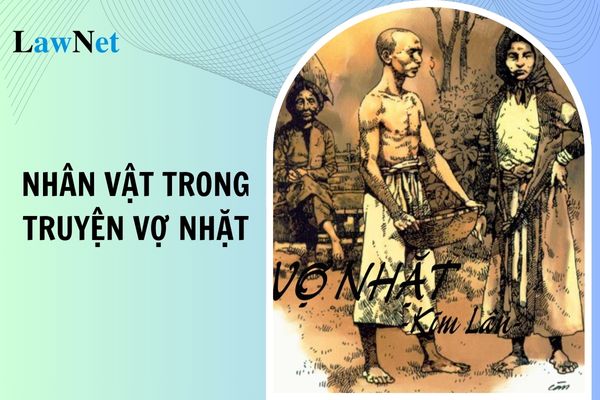Vietnam: What are the guidelines for analysis of the emotional development of characters in the "Vo Nhat" work? Is it permissible to organize extra classes for 11th-grade Literature?
What are the guidelines for analysis of the emotional development of characters in the "Vo Nhat" work in Vietnam?
In Kim Lan's "Vo Nhat" work," there are three main characters: Trang, Thi, and Mrs. Tu. The emotional development of characters in the "Vo Nhat" work changes over three different periods. Below are the guidelines for analysis of the emotional development of characters in the "Vo Nhat" work in Vietnam:
1. Character: Trang
| - Initially: Trang is a poor man living in hunger and instability. When he meets Thi, he feels compassion and decides to "pick" her up as his wife. Trang’s mood is a mix of compassion and recklessness, reflected in the phrase "Trang laughed heartily, his eyes sparkling." - When bringing Thi home: Trang feels both happy and worried. He is happy to have companionship but also anxious about the uncertain future. This is evidenced by the phrase "Trang felt apprehensive and worried, but also a bit delighted." - By the end of the story: Trang feels family happiness and hopes for a better future, despite the ongoing hardships. This is shown in the passage "Trang felt relieved, as if a burden had been lifted." |
2. Character: Thi
| - Initially: Thi is a hungry and homeless woman. When she meets Trang, she agrees to go home with him for just a few bowls of banh duc, showing her desperation and desire to survive. This is depicted in the phrase "Thi ate heartily, oblivious to her surroundings." - When at Trang’s home: Thi feels embarrassed and anxious when she meets Trang’s mother. However, she also senses warmth and love from the new family. This is indicated in the passage "Thi bowed her head, not daring to look directly at Mrs. Tu." - By the end of the story: Thi begins to feel at ease and hopeful for the future. She, Trang, and Mrs. Tu create a new family, filled with love and unity despite many difficulties. This is evidenced by the passage "Thi felt warm inside, as if shielded by a real family." |
3. Character: Mrs. Tu
| - Initially: Mrs. Tu is an elderly mother living in poverty, worried about her son's future. Seeing Trang bring Thi home, she is surprised and anxious about feeding another mouth amidst hunger. This is vividly expressed in the phrase "Mrs. Tu was stunned, not believing her eyes." - When accepting Thi: Mrs. Tu gradually accepts Thi and feels sympathy for her situation. She begins to have more positive thoughts about the future and hopes for change. This is depicted in the passage "Mrs. Tu smiled, her heart full of compassion and hope." - By the end of the story: Mrs. Tu experiences family happiness and hopes for a brighter future. She becomes optimistic and trusts in the unity and love of the family. This is shown in the phrase "Mrs. Tu felt relieved, as if a burden had been lifted." |
Note: The above guidelines for analysis of the emotional development of characters in the "Vo Nhat" work are for reference purposes only!

What are the guidelines for analysis of the emotional development of characters in the "Vo Nhat" work in Vietnam? Is it permissible to organize extra classes for 11th-grade Literature? (Image from the Internet)
Is it permissible to organize extra classes for 11th-grade Literature in Vietnam?
According to Article 4 of the Regulation on extra classes issued together with Circular 17/2012/TT-BGDDT, the provisions are as follows:
Banned extra classes
1. Extra classes shall not be provided for students who have attended curricular classes for 2 sessions per day.
2. Extra classes shall not be provided for elementary students, except for extra-curricular activities: arts, sports, or life skills.
3. Higher education institutions, colleges, junior colleges and vocational schools are banned from hold extra classes with compulsory education contents.
4. A teacher receiving salaries from wage-fund of public service agencies is banned from:
a) Holding external extra classes unless he/she conducts external extra classes;
b) Conducting external extra classes for students who are in his/her curricular classes without the permit of the Head of his/her superior agency.
Therefore, unless students have attended curricular classes for 2 sessions per day, the school is permitted to organize extra classes for 11th-grade Literature if students voluntarily request extra learning.
What are the rules for extra classes in Vietnam?
Under Article 3 of the Regulation on extra classes issued together with Circular 17/2012/TT-BGDDT, the rules for extra classes in Vietnam are as follows:
- Extra classes must help to broaden knowledge, skills and character education of students, be suitable for psychological and physical characteristics and not beyond the acquisition of learners
- It is not allowed to reduce the curricular contents of compulsory education program and add them to extra classes; and provide the curricular contents in the extra classes in advance.
- Students taking extra classes are students who intend to attend extra classes with the consent of their families; it is not allowed to compel students or students’ families to attend extra classes.
- It is not allowed to provide extra classes according to the curricular classes; students in the same extra class shall have the same learning capacity; the students are admitted to the extra classes according to their learning capacity.
- Extra class providers shall be responsible for their registration and application for the license.

